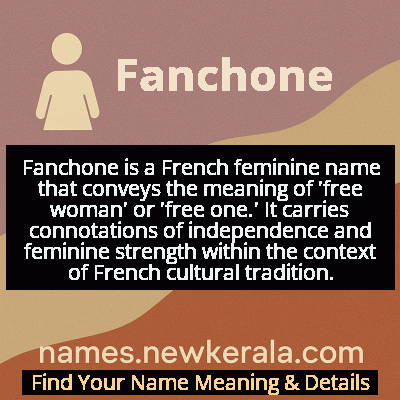Fanchone Name Meaning & Details
Origin, Popularity, Numerology Analysis & Name Meaning of Fanchone
Discover the origin, meaning, and cultural significance of the name FANCHONE. Delve into its historical roots and explore the lasting impact it has had on communities and traditions.
Name
Fanchone
Gender
Female
Origin
French
Lucky Number
3
Meaning of the Name - Fanchone
Fanchone is a French feminine name that conveys the meaning of 'free woman' or 'free one.' It carries connotations of independence and feminine strength within the context of French cultural tradition.
Fanchone - Complete Numerology Analysis
Your Numerology Number
Based on Pythagorean Numerology System
Ruling Planet
Jupiter
Positive Nature
Optimistic, inspirational, and creative.
Negative Traits
Scattered, exaggerating.
Lucky Colours
Yellow, gold, purple.
Lucky Days
Thursday.
Lucky Stones
Yellow sapphire.
Harmony Numbers
1, 2, 9.
Best Suited Professions
Arts, writing, communication.
What People Like About You
Creativity, optimism.
Famous People Named Fanchone
Fanchone Guillou
French Resistance fighter
Heroic member of the French Resistance during World War II
Fanchone de la Porte
Literary figure
Notable French salonnière and intellectual hostess in Parisian literary circles
Fanchone Le Gall
Traditional singer
Preserved and performed traditional Breton folk songs and music
Name Variations & International Equivalents
Click on blue names to explore their detailed meanings. Gray names with will be available soon.
Cultural & Historical Significance
In the 19th and early 20th centuries, Fanchone embodied the archetype of the strong, practical French country woman – resilient, hardworking, and deeply connected to her local community. The name evokes images of traditional French village life, where women played crucial roles in maintaining family businesses, agricultural work, and cultural traditions. While less common in urban centers, Fanchone remained a cherished name in provincial France, representing authenticity and connection to French rural heritage.
The name also reflects the linguistic evolution of French regional dialects and the affectionate naming practices that characterized French family life. As France modernized and centralized, names like Fanchone became symbols of regional identity and resistance to cultural homogenization, preserving local character while still operating within the broader French cultural framework.
Extended Personality Analysis
Women named Fanchone are often perceived as possessing a unique blend of traditional values and independent spirit. They typically exhibit strong practical intelligence, reliability, and a deep sense of loyalty to family and community. Their grounded nature combines with a quiet determination that allows them to navigate challenges with resilience and grace. There's often a warmth and authenticity to their character that makes them trusted confidantes and valued members of their social circles.
Fanchones tend to be resourceful problem-solvers who approach life with both pragmatism and creativity. They often demonstrate excellent organizational skills and the ability to manage multiple responsibilities effectively. While they may appear reserved initially, they possess strong convictions and will stand firmly for what they believe is right. Their independence doesn't manifest as rebellion but rather as a quiet self-assurance and capability that earns respect naturally.
These women typically value deep, meaningful relationships over superficial connections and often serve as the emotional anchors in their families and communities. They bring a sense of stability and reliability to any situation, combined with an intuitive understanding of people and situations. Their strength lies in their ability to maintain their core values while adapting to changing circumstances, making them both traditional and progressive in their approach to life's challenges.
Modern Usage & Popularity
In contemporary times, Fanchone has become quite rare as a given name, primarily preserved within families with strong regional French heritage or among those seeking unique, traditional names. While it experienced significant decline during the mid-20th century as more modern, international names gained popularity, there has been a modest revival interest in recent years among parents looking for distinctive names with historical French character. The name currently occupies a niche position – not among popular baby names but cherished by those who appreciate its authentic French roots and charming, old-world quality. It appears occasionally in birth registries in regions like Brittany and Normandy, where families maintain connections to their cultural heritage, and among French expatriates seeking to preserve their linguistic and cultural identity abroad.
Symbolic & Spiritual Meanings
Symbolically, Fanchone represents freedom within tradition – the ability to maintain one's independence while honoring cultural heritage. The name carries connotations of earthy practicality combined with feminine strength, evoking images of the capable French country woman who manages both household and community with equal competence. It symbolizes resilience, authenticity, and the quiet power that comes from being grounded in one's identity and values. The name also represents cultural continuity, serving as a living connection to French regional history and the enduring spirit of provincial France. Metaphorically, Fanchone embodies the idea that true strength often lies in quiet competence rather than loud assertion, and that freedom is found not in rejecting tradition but in understanding how to work within it to create meaningful, self-directed lives.

